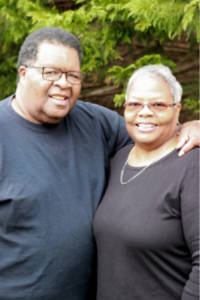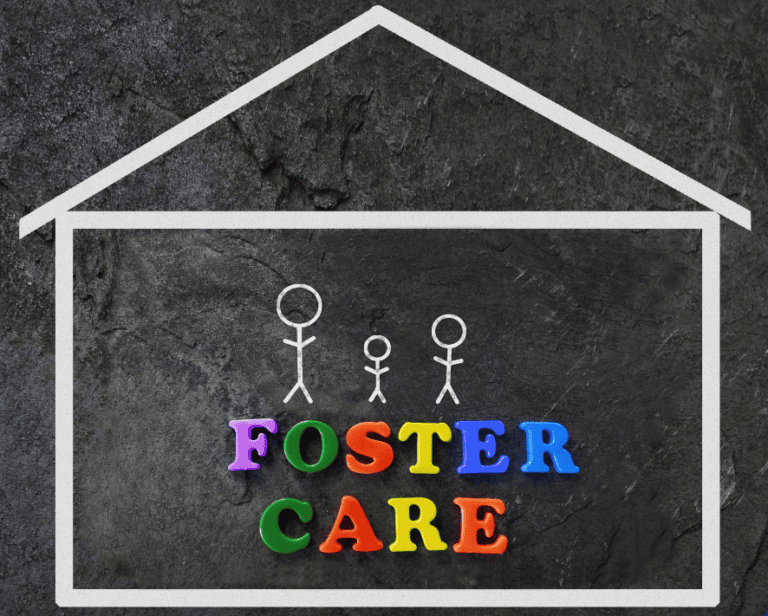In 1990, Carolyn Butler answered an ad she saw in the paper posted by her future husband, Norman, looking for companionship. After reaching out, the two talked by phone for three months before meeting in person. But when they finally did meet, both say the relationship was a Godsend, meant to be. “It’s like we already knew each other,” says Carolyn.
Little did they know, thirty years later, they would have a happy marriage of 28 years (and going strong!) and would have been foster parents for 23 of those years. Carolyn has always loved children. She was not able to have biological children, but she does have ten nieces and nephews. “I’ve spoiled every one of them,” she jokes.
The call to foster parenting.
Carolyn worked with severely mentally handicapped children for years and was also a group home director, where she developed a foster care program. She certainly has a heart for the hurting. But as she recruited prospective foster parents, she realized she couldn’t really talk to them about what they were going to experience or directly relate to what they were going through. Thus, began the call on her own life to become a foster parent.
It took a while for Norman to get on board. “I wasn’t ready,” he says, “I fought it for a while, but she kept working on me. I finally gave in.” He smiles. Carolyn and Norman, who is a school system retiree, knew they could provide a safe and stable home. “We were married, financially stable. There was a need. We knew we could give love to a child,” says Carolyn. They couldn’t have foreseen that they would go on to provide love, stability, safety, and hope to 15 children (and counting!).
The Butlers are sure and confident of their calling to foster. Carolyn makes it clear that the greatest victory of foster care is seeing a child reunited with his or her biological family. They want to practice “shared parenting” with every child’s biological parents, if they are able. Carolyn recalls one mother, in particular. Carolyn and Norman walked by this mother’s side and helped her get her daughter back. And they helped provide the stability, structure, and safety the woman’s daughter needed in the meantime. “I watched [her mom] work that plan. We helped and encouraged her. I knew she loved her kids.” Thanks to the Butler’s support and the bio mom’s hard work, that child has safely returned home to her mother, and things are going really well.
Pushing through the struggles.
But there are other times it’s been harder. One mother felt Carolyn and Norman were going to take over. She felt threatened. “We sat down with her,” Carolyn says, “I told her, ‘I want to help him get back home to you. You are his mother, not me. I want you to know everything that is going on. And when he comes home for visits, I want you to know what skills we’re working on here, so you can both be successful there.’” In the end, the mom came to believe the Butlers were on her side and felt supported and empowered.
 Right now, the couple is fostering a preteen young lady. They are working together as she finds her way. “She has some challenges,” say the Butlers. “But we know where her struggles come from and we’re working through them.” Like with most children, especially children from hard backgrounds, consistency, safety, and security go a long way. “She’s trying and we see her trying,” says Carolyn. Like with all of their children, they will do their best to see her all the way to permanency, whether that be reunification or adoption.
Right now, the couple is fostering a preteen young lady. They are working together as she finds her way. “She has some challenges,” say the Butlers. “But we know where her struggles come from and we’re working through them.” Like with most children, especially children from hard backgrounds, consistency, safety, and security go a long way. “She’s trying and we see her trying,” says Carolyn. Like with all of their children, they will do their best to see her all the way to permanency, whether that be reunification or adoption.
Happy (funny) memories.
The Butlers are full of laughter, smiles, and funny stories. One thing is clear – to be a long-term foster parent, a good sense of humor comes in handy. There was 16-year-old Johnny* who was sneaking out of the house with a ladder he stashed under his bed. To get back in, he’d prop the ladder up on a rickety, plastic lawn chair. After the Butlers saw the chair at the corner of the house and questioned him, he admitted the truth. He recounted a close call almost getting trapped outside all night, and responded, “Well, I ain’t gonna do that no more. I had a hard time gettin’ back in.” Needless to say, they never had that problem again.
 There was also 7-year-old Luke* who jumped out his window, ran across the street, and knocked on the door to play with the neighbor kids. The neighbor brought him back, and Carolyn informed Luke that next time he wanted to play with the neighbors, he could just ask. Luke was also kicked out of summer camp after just a couple days. The final straw was when he hid himself under a bus and wouldn’t come out. “They called us to come get him,” says Norman. “They couldn’t take any more Luke.” The couple just laughs and laughs. You can see the love in their eyes as they recount each memory. These stories may have been trying but also cemented in their hearts the work they were called to do and the difference they were able to make in each life. “I liked Luke,” says Carolyn, “I really, really did.”
There was also 7-year-old Luke* who jumped out his window, ran across the street, and knocked on the door to play with the neighbor kids. The neighbor brought him back, and Carolyn informed Luke that next time he wanted to play with the neighbors, he could just ask. Luke was also kicked out of summer camp after just a couple days. The final straw was when he hid himself under a bus and wouldn’t come out. “They called us to come get him,” says Norman. “They couldn’t take any more Luke.” The couple just laughs and laughs. You can see the love in their eyes as they recount each memory. These stories may have been trying but also cemented in their hearts the work they were called to do and the difference they were able to make in each life. “I liked Luke,” says Carolyn, “I really, really did.”
The reward in the return.
Norman says that one of the true blessings of this work is when the kids come back to visit. Although they may not have completely understood when they were young, they grow to value the impact the Butlers had in their lives. “You’ve touched them,” Norman says, “and they come back and want to thank you.” Carolyn agrees. “Something goes through you when they come back. It’s special.” They tell of James* who was with them for a while. He left when he was 13, but recently came back to visit. He’s 22 now and in college at UNC Wilmington. He hugged Carolyn so tightly and said, “I had a lot of anger in me back then. I appreciate now what you were trying to do.” They tell of a 5-year-old girl, their second placement, who was with them for a year before she was adopted. “We had looked and looked and couldn’t find her,” says Carolyn, “and out of the blue, she called us one day.” That young lady is 25 now, married, and doing well.
A surprise blessing.
The most unexpected blessing they received through their first placement, a 7-year-old girl who was with them until she grew up and moved out on her own. “I fell in love with her,” says Carolyn, “I was surprised at how fast. It was just like she came out of my belly. That’s my child.” And in a surprising twist, that baby grew up and had a baby (on Carolyn’s birthday no less!), and now the Butlers have a grandson. Kamari is 10-years-old, lives in the area, and stays with his grandma and grandpa every other weekend.
It’s this kind of affirmation that keeps the Butlers doing this important work. It’s not easy, they say, but is worth it to give vulnerable children the tools, structure, and foundation they need to be successful in the future. “These kids don’t ask to be born,” says Carolyn, “and it’s not their responsibility to raise themselves. Somebody has to do that. And it’s our privilege. We give them skills. We nurture them, love them. And if they fail, we’re here to pick them up. We meet them where they are.” Norman agrees. “We just model the right way,” he says simply. “Every kid is worth it.”
Determined obedience.
The Butlers are determined to be obedient to the Lord’s calling on their lives. They say there are hard times – when the courts push for reunification or adoption before the child or family is ready, which can result in failed adoptions or the children coming back into care. Carolyn also says it’s hard when she feels they’ve done all they can, but the child isn’t ready yet to accept help. “I don’t want them to leave here until they’re ready to go to their permanent place.” And sometimes you can’t control the decisions made on their behalf or whether or not the children are ready.
 Some might argue that this job is too hard. “I can’t do it. I’d get too attached,” people say. But children in foster care need that most of all – hearts that will attach. “Oh, I get attached,” says Carolyn, “but I still know it’s my job. I love what I do, but I had to learn how to separate some of my feelings. I know what my job is, and I want to see them go home. They know they can call us when they need us.”
Some might argue that this job is too hard. “I can’t do it. I’d get too attached,” people say. But children in foster care need that most of all – hearts that will attach. “Oh, I get attached,” says Carolyn, “but I still know it’s my job. I love what I do, but I had to learn how to separate some of my feelings. I know what my job is, and I want to see them go home. They know they can call us when they need us.”
The Butlers know what they’ve been called to do and do it with love, compassion, and strength. There have been times when they were broken, when the courts didn’t work in the child’s best interest, when the biological parents have been less than cooperative, and when the child wasn’t ready to accept what Carolyn and Norman were trying to teach. But they both know in the end, they are bettering the future, one life at a time. Norman says he wants all his kids, and all 15 are still his kids, that they can carry through. “That bell will go off one day,” he says, “and they’ll say, ‘I remember the Butlers. I couldn’t hear them then, but I see it now.’” “I want them to realize how special they are,” says Carolyn, “that they have something to contribute to the world. I don’t want them to waste their lives.”
What it takes to make it work.
Every child deserves a chance to be successful, the couple says. “We love what we do,” says Carolyn, “It’s all about the kids. If we don’t teach them, the world’s going to teach them.” Norman adds that to be successful you have to love each other first, “You have to love each other before you can love someone else. Maybe it’s not for everyone, but it has worked for us.” And after 23 years, they haven’t even discussed retirement. “We’ll know. It’s not time yet. But we’ll know when it’s time.”
The couple says becoming foster parents may not be for everyone, but for the ones who are willing, the need is too big to ignore the call. These children deserve structure and safety. Their chance at stability and healing are worth more than the sadness or loss we may feel when they go. Be willing to stand in the gap for a child in a very hard place. Carolyn and Norman would tell you it’s worth it 15 times over. “Don’t think about helping all the children,” says Carolyn, “Help one. One child at a time.” If you have ever considered foster care, they would urge you to take the chance. Risk your heart. Answer the call. Not for all. But at least for one.
To find out more about foster care and how you can make a difference, visit our website at www.crossnore.org/foster-care-adoptions.
*Names have been changed for confidentiality.



